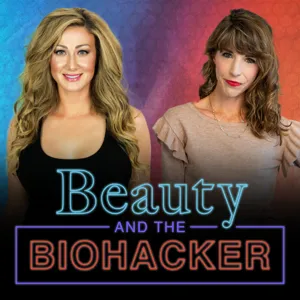Podcast Summary
Impact of Antibiotics on Gut Microbiome: Antibiotics can harm the gut microbiome, causing long-term damage. Vulnerable individuals, such as those with a history of IBS or diarrhea, may be more affected. Careful consideration and specific foods may aid in recovery.
Antibiotics, while necessary to save lives, can cause damage to the gut microbiome, including the one belonging to the host. This damage can be long-lasting and unclear if probiotics can fully help in recovery. The discussion revolved around the story of a person who, in a mishap, ended up taking the antibiotic clindamycin, which has a broad-spectrum effect and can negatively impact the gut microbiome, especially for individuals with a vulnerable gut, such as those with a history of irritable bowel syndrome or diarrhea. The experts advised that caution and careful consideration should be given when prescribing and taking antibiotics, and that specific foods may help in the recovery process.
Antibiotic Clindamycin disrupts bacterial protein production, affecting both targeted and gut bacteria: Clindamycin's broad-spectrum effect can disrupt gut bacteria, increasing risk of infections, while its short-term use for minor infections may overlook long-term risks.
The antibiotic Clindamycin, which was prescribed to John due to a concern for penicillin allergy, has a broad-spectrum effect that destroys not only the targeted bacteria but also anaerobic bacteria, which are the majority in our gut. This can lead to an increased risk of gut infections like C. Diff. Antibiotics like Clindamycin work by disrupting the production of proteins essential for bacterial growth. They are derived from other microbes and are magnified through genetic modification and chemical synthesis. The doctor's short-term view in prescribing this heavy-duty antibiotic for John's toe infection, despite its potential long-term risks, highlights the importance of considering the entirety of a patient's health and the potential consequences of antibiotic use.
Antibiotics disrupt gut microbiome balance, leading to C. diff infections: Antibiotics can harm beneficial gut bacteria, leading to C. diff infections and other health issues. Consider alternatives for maintaining gut health.
While we use antibiotics derived from nature to combat unwanted microbes, these treatments come with unintended consequences. They not only target the harmful bacteria but also wipe out the beneficial ones in our gut, disrupting the balance and leading to infections like C. diff. This imbalance can result in diarrhea and even life-threatening colon infections. The antibiotics travel through the body, getting absorbed into the bloodstream and interacting with the gut microbes, causing damage. Despite initial attempts to treat C. diff infections with more antibiotics, the recurring nature of these infections and their resistance to traditional treatments have made it a significant concern. It's crucial to understand the impact of antibiotics on our gut microbiome and consider alternative methods for maintaining a healthy balance when possible.
Expert advice on gut health after antibiotics: Focus on Saccharomyces boulardii at a specific dose instead of commercial probiotics after taking antibiotics. Consider fermented foods for gut health improvement.
During a discussion about improving gut health after taking antibiotics, the experts recommended a specific probiotic, Saccharomyces boulardii, at a specific dose, instead of a broad mix or commercial probiotics. The reason was that there's evidence suggesting that probiotics given at the same time as antibiotics can make recovery slower, possibly due to the introduction of new microbes hindering the return of the old community. The experts advised taking fermented foods instead. This was a surprising recommendation, as the listener had expected suggestions for a broad mix of probiotics. It's important to note that the current evidence suggests not taking commercial probiotics for gut microbiome improvement, but rather focusing on fermented foods. This advice emphasizes the importance of considering the specific context and evidence when making decisions about gut health.
Choosing the Right Probiotic for Antibiotic Protection: Saccharomyces boulardii, a yeast-based probiotic, reduces antibiotic-associated diarrhea and C. diff infections by 60% in clinical trials. Targeted probiotics are more effective than fermented foods for high-risk individuals.
When considering the use of probiotics to mitigate the risks of antibiotics, it's crucial to prioritize evidence-based options. For instance, Saccharomyces boulardii, a specific yeast-based probiotic, has substantial evidence from randomized controlled trials showing a 60% reduction in antibiotic-associated diarrhea and C. diff infections. Although fermented foods provide benefits, they may not offer the same level of protection as targeted probiotics, especially for those at higher risk, such as young infants, the elderly, or individuals with inflammatory bowel disease or a history of C. diff infections. Ultimately, healthcare professionals must weigh the specific antibiotic, the patient's history, and the available evidence to make informed decisions.
Antibiotics disrupt gut health, fermented foods restore balance: Antibiotics can decrease gut health, but consuming fermented foods with probiotics can help restore balance and improve overall gut health
Antibiotics, while effective in treating infections, can significantly disrupt the balance of good bacteria in the gut, leading to a decrease in overall gut health. This was evident in a personal anecdote shared by an individual who saw their gut health score drop from 78 to 40 within a week of starting antibiotics. Furthermore, research suggests that while most people recover from this disruption within eight weeks, a quarter of individuals may not fully regain their previous levels of good bacteria. Fermented foods, on the other hand, offer a natural source of probiotics and a greater diversity of beneficial bacteria compared to probiotic supplements. These foods, which include yogurt, cheese, kefir, sauerkraut, kombucha, kimchi, and miso, among others, have been consumed for centuries and can help restore the balance of good bacteria in the gut. While the doses of probiotics in these foods may be lower than in supplements, the greater diversity of bacteria can lead to better overall gut health.
Consuming diverse fermented foods benefits gut health: Eating a variety of live, unpasteurized fermented foods like kefir, kimchi, and kombucha can reduce inflammation, boost immunity, and restore gut health.
Consuming a diverse range of fermented foods can be beneficial for gut health as they contain various microbes that collectively have a better chance of restoring the gut to health. These foods, such as kefir, kimchi, and kombucha, have been shown to reduce inflammation and boost the immune system in randomized controlled trials. To ensure the live bacteria are present in these foods, it's important to check the label for low or no added sugars, no artificial sweeteners, and no pasteurization. Look for signs of fermentation like sediment, fizz, and a pungent taste. These are indicators that the food is alive and contains active beneficial bacteria.
Ensure Authenticity of Fermented Foods and Probiotics: Look for 'live active cultures' or 'live probiotics' on labels, avoid long shelf lives and artificial ingredients. For fermented plant foods, check for just plant, water, and salt. Be cautious with antibiotics and focus on fiber intake for gut health.
When it comes to consuming fermented foods or probiotics, it's crucial to be vigilant and ensure that what you're getting is the real deal. Look for "live active cultures" or "live probiotics" on the label, and be wary of products with long shelf lives and numerous artificial ingredients. For fermented plant foods like sauerkraut or pickles, the ingredients should be the plant, water, and salt. When in doubt, making these foods at home is the best option. Unfortunately, antibiotics can cause a significant imbalance in the gut microbiome, leading to dysbiosis. In this state, bad bacteria can flourish, making it important to focus on increasing fiber intake to support the growth of good bacteria. Regular testing and monitoring can help track progress and ensure that efforts are moving in the right direction.
Supporting gut health through diet and lifestyle: Eat fiber-rich, plant-diverse foods, reduce ultra-processed foods, refined carbs, sugar, artificial sweeteners, high saturated fat intake, and alcohol. Practice time-restricted eating and get a good night's sleep for gut health and immune support.
Maintaining a healthy gut involves feeding the good bacteria with fiber-rich, plant-diverse foods and reducing consumption of ultra-processed foods, refined carbohydrates, sugar, artificial sweeteners, high saturated fat intake, and alcohol. Additionally, time-restricted eating and getting a good night's sleep can support gut health and immune cells. For some individuals, recovery from antibiotic use may take longer than others, and personalized approaches based on individual gut health data could be beneficial in the future. Overall, the goal is to support the growth of beneficial bacteria and minimize the impact on harmful bacteria.
Mindful Antibiotic Use: Benefits and Risks: Be mindful of antibiotic use and consult with healthcare professionals to ensure effective and necessary treatment, minimizing negative consequences.
The appropriate use of antibiotics is crucial for both personal health and the prevention of antibiotic resistance. Overuse of antibiotics is linked to increased allergies and weight gain, particularly in children. As medical professionals and patients, it's essential to consider the benefits versus risks of antibiotic use, including the need for the antibiotic, the appropriate antibiotic, and the length of treatment. Antibiotics are a vital medical invention, but their overuse can have negative consequences. By asking questions and being thoughtful about antibiotic use, we can minimize our exposure while still receiving the benefits. The speaker says that even after taking numerous antibiotics, it's possible to improve gut health. So, the key takeaway is to be mindful of antibiotic use and consult with healthcare professionals to ensure the most effective and necessary treatment.
Antibiotics and Their Impact on Gut Health: Overuse of antibiotics can disrupt the gut microbiome, leading to health issues and antibiotic resistance. Consider alternatives and be mindful of diet to maintain a healthy gut microbiome.
Antibiotics, while life-saving, should be used thoughtfully due to potential side effects on the gut microbiome. The overuse of antibiotics, particularly in children in the US, can lead to poor gut health and contribute to antibiotic resistance. Antibiotics are often used in agriculture to fatten animals, leading to residues in the meat. A study in 2014 found that just five days on an animal-based diet led to antibiotic resistance in the gut. Doctors and patients should be aware of these risks and consider alternatives when possible. Antibiotics are amazing inventions that have saved countless lives, but their overuse can have negative consequences. It's essential to be mindful of the potential side effects and only use antibiotics when necessary. The gut microbiome plays a crucial role in overall health, and its disruption can lead to various health issues. By reducing the use of antibiotics and being more conscious of our diets, we can help maintain a healthy gut microbiome and avoid the development of antibiotic resistance.
Supporting Gut Health After Antibiotics: Fermented foods, fiber-rich diets, time-restricted eating, sleep, and exercise can help mitigate the negative impact of antibiotics on the gut microbiome.
While antibiotics can be effective in treating certain health issues, they can also negatively impact the gut microbiome. The good news is that there are steps you can take to support gut health in the long term. Fermented foods, such as kimchi, kombucha, and kefir, can provide a greater variety of beneficial bacteria than supplements. A diet rich in fiber is also crucial for supporting good bugs and reducing the presence of harmful bacteria over time. Other strategies, like time-restricted eating, sleep, and exercise, may also contribute to gut health. While antibiotics can be seen as a "nuclear bomb" for the gut microbiome, these lifestyle changes can help mitigate their impact and promote overall health. If you're interested in learning more about how to support your gut microbiome with personalized nutrition recommendations, consider trying ZOE's personalized nutrition program. Use the code PODCAST10 for a 10% discount at joinzoe.com/podcast.





